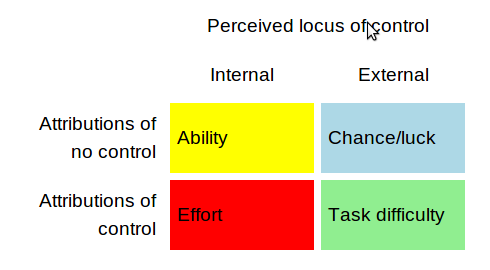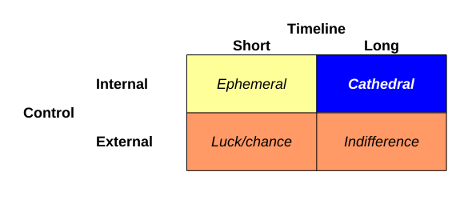Ten year haul from within
Tweet
rss
Recently, I attended SF Uncubed - a job-fair and networking event. Kristina Wallender, VP of Marketing at Ticketfly talked about lessons she learned from Amazon, and one insight struck me. Specifically, instead of asking what may change in 10 years? we should instead ask and answer what will remain unchanged in 10 years?.
If you are thinking about building something good or cultivating a new skill, I think this is a really important guiding thought. And it may lead you to reflect further about two related themes:
- Time horizon: long-term versus short-term, and
- Control: internal versus external locus of control
Long-term vs Short-term
The time theme pertains to how human beings learn a new skill. That in turn relates to attaining competence and mastery, which relates to doing good work. The quality of your work is built upon foundational skills, which takes time and focus and practice.
The concept preceding the science is intuitively relatable. Think about learning to read sheet music and playing piano. The music is gibberish at first. Like a language, it takes time to learn the vocabulary of symbols. Then, while you can read the music, your reading is slow - think of a child at a piano lesson. Overtime, your reading improves to a point of being able to play at a glance. And you will also observe that the ability to match the reading to actual finger actions is limited. It takes exercises and time to train th fingers to make the leaps, to scale up and down the keyboard quickly. You literally have to build new finger muscles, and match the action to your brain. You will see that this has similar parallels to learning a foreign language, except that there is a manual (hand) coordination component to the skill of playing piano.
What we are talking about here is forming new neural connections. We repeat exercises, whether musical or athletic, until we form new synapses. The process has an accelerating return, such that the more you do, the quicker and better you become (until some limit). Because the time is the limiting factor, we can intelligently apply systems that help us in the growth journey.
For example, apprenticeship under a master can help us learn more quickly, and create connections through mirror neurons. Mirror neurons help us learn simply by watching someone else, which is something of an evolutionary miracle. Among other things, this helps us form empathy, or to put ourselves in someone else's shoes (important if you are building something for a user). But, it also means that in the process of learning, we need not reinvent things - we can learn from others. Another technique concerns limiting the quantity of things we may need to learn by deconstructing a discipline and applying 80/20 rule. In essence, this is the school of Tim Ferriss's The 4-Hour Workweek.
There is much that can be said about this topic. And I wrote a related post for a product management community, reflecting on competence and mastery. The main point is that good things take time to build, and it is wisdom itself to focus on things that do not change versus things that change, especially because it will take time to build something good.
Internal vs External
The other night, a friend came over for a drink, and I was sharing with him my project ideas. Sometimes, I expressed frustration at my inability to bring ideas to successful fruition.
My friend then pointed out that he was hearing lot of external causes in how I talked about a project. He said, “If you really want it done, you can find ways to make it happen.”
If you really want something done, you can find ways to make it happen.
In other words, he told me stop making excuses and get off my ass! But, the thought has a fascinating psychological underpinning about how you view the world. You either believe you are in control of something or not, and you behave accordingly. I found this chart of locus of control on wikipedia.
source: Wikipedia locus of control
It is ironic to me that the “effort” is highlighted in the warning color of red! The interesting thing is that our brains will connect differently based on our perception of control, and drive how we behave. For example, if you feel you do not have control, you assign things to luck or to natural-talents and move on. Instead, if you believe in control, and recognize it takes hard work, you are going to deconstruct what you need and invest the hours.
Putting it together
I saw an interesting tidbit that applies these themes. After attending Uncubed, I attended a talk by Uber engineers about how they built the signup page (yes, it was a busy day). Uber is a taxi service that turned into a multi-billion dollar mobile app empire. Signup pages are a web/mobile front-end technology, and by nature ephemeral and constantly changing. As a side note (perhaps as a mental slip) the engineers described how there is another team building scalable technology that will create foundations for a long-term growth, a ten-thousand year foundation.
I might suggest the following 2x2 using these two axes. Building a cathedral takes time.
Building philosophy - source: author
How does this model apply to your career or to the product you are building?
Suggestions?
What do you want to talk about? Send your suggestion! If you found this useful, please share it and subscribe.
comments powered by Disqus
Get new posts via email:
About David

David at Crater Lake National Park
Read recent posts
- Guides to help you think like a hacker even if you don't program
- Mapping Your Career
- Does your company Quora?
- Mobile product teardown TripIt vs TripCase
- Hotel Tonight teardown: trigger and room analysis

